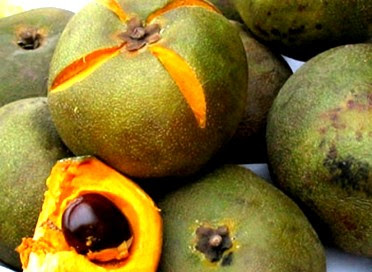The lúcuma (Pouteria lucuma) is a subtropical fruit native to the Peru's Andean region. Lucuma has been found on ceramics at burial sites of the indigenous people of coastal Peru. The Moche people had a fascination with agriculture and often chose to represent fruits and vegetables, including lucuma, in their art.
The fruit was first seen and reported by Europeans in the Chinchasuyu region of the Inca Empire in 1531. It is sometimes known as lucmo. It is also called "eggfruit" in English, a common name also given to the closely related canistel (Pouteria campechina). The name "eggfruit" refers to the fruits' dry flesh, which is similar in texture to a hard-boiled egg yolk. The lucuma has particularly dry flesh which possesses a unique flavor of maple and sweet potato. It is a very nutritious fruit, having high levels of carotene, vitamin B3, and other B vitamins. The round or ovoid fruits are green, with a bright yellow flesh that is often fibrous. It grows at temperate elevations, between 1,000-2,400 metres. Temperatures of its elevated native range make the species technically subtropical, even though its native region is strictly tropical. It has been grown successfully in subtropical foothills of California. Attempts at growing lucuma in Florida's climate typically fail. In addition to Ecuador, Peru, and Chile, the fruit is grown also to a limited extent in Bolivia and Costa Rica. It grows well in most tropical regions, but is not widely favored. The fruit is also available in large quantities in Lao People's Democratic Republic and in Vietnam. Within its own genus there are multiple species considered to have a superior flavor, such as the Mamey (Pouteria sapota), Abiu (P. caimito), Canistel (P. campechina), Green Sapote (P. viridis).
It has recently become popular as a dried powder flavoring, and production of fruits dried for export is increasing on a large scale. Lúcuma is a popular flavoring for ice cream in its native range, and in Chile and Peru even exceeds the demand for strawberry, chocolate, and vanilla.
The fruit was first seen and reported by Europeans in the Chinchasuyu region of the Inca Empire in 1531. It is sometimes known as lucmo. It is also called "eggfruit" in English, a common name also given to the closely related canistel (Pouteria campechina). The name "eggfruit" refers to the fruits' dry flesh, which is similar in texture to a hard-boiled egg yolk. The lucuma has particularly dry flesh which possesses a unique flavor of maple and sweet potato. It is a very nutritious fruit, having high levels of carotene, vitamin B3, and other B vitamins. The round or ovoid fruits are green, with a bright yellow flesh that is often fibrous. It grows at temperate elevations, between 1,000-2,400 metres. Temperatures of its elevated native range make the species technically subtropical, even though its native region is strictly tropical. It has been grown successfully in subtropical foothills of California. Attempts at growing lucuma in Florida's climate typically fail. In addition to Ecuador, Peru, and Chile, the fruit is grown also to a limited extent in Bolivia and Costa Rica. It grows well in most tropical regions, but is not widely favored. The fruit is also available in large quantities in Lao People's Democratic Republic and in Vietnam. Within its own genus there are multiple species considered to have a superior flavor, such as the Mamey (Pouteria sapota), Abiu (P. caimito), Canistel (P. campechina), Green Sapote (P. viridis).
It has recently become popular as a dried powder flavoring, and production of fruits dried for export is increasing on a large scale. Lúcuma is a popular flavoring for ice cream in its native range, and in Chile and Peru even exceeds the demand for strawberry, chocolate, and vanilla.





